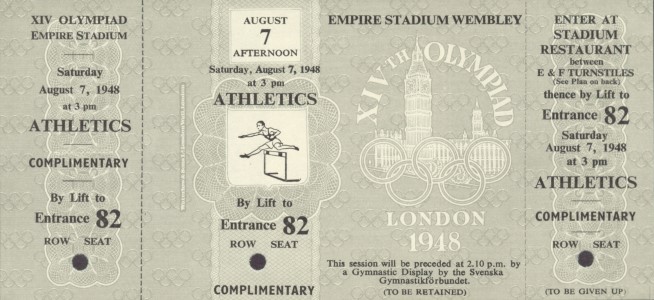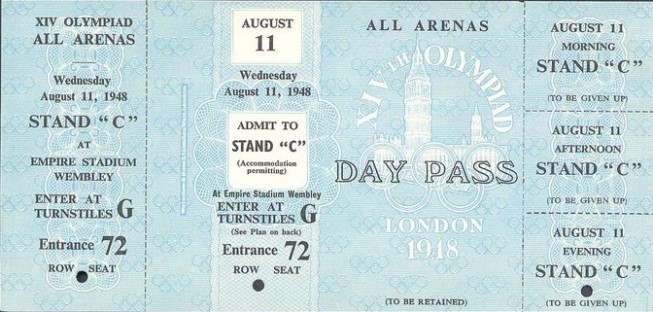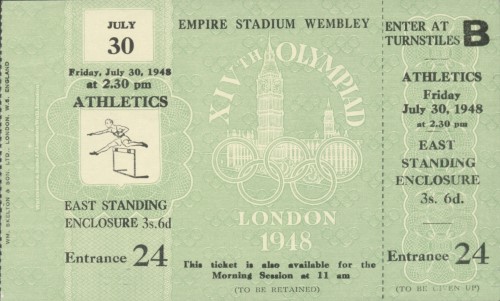Tickets
| A. Season Tickets
At previous Olympic Games, it had been possible
to purchase season tickets enabling the holder to see any of the events.
Such season tickets had been " transferable " but, owing to the simultaneous
holding of several events, a situation had arisen whereby reserved accommodation
was not used, and at the same time people were turned away. The popularity
of the Games is such that this system could no longer be justified and
it was decided that season tickets would not be available for London, 1948.
It was felt that it should be possible for
persons from other countries to come to the Games with the certainty that
they could see a competitor taking part in his event. It was, therefore,
decided to sell books of series tickets for each sport, giving admission
to every session of that sport, and to give priority to applications for
these books. This system did not include the Football and Hockey preliminaries,
in which matches took place simultaneously, or Water Polo, as distinct
from Swimming and Diving. In arriving at these decisions, the Committee
was influenced by the fact that there is an overwhelming demand for admission
to events of outstanding interest, often to the exclusion of the bona fide
sportsman, who is also interested in the sessions in lesser demand. It
was considered that those who are sufficiently interested in a sport to
attend all the sessions, should have priority. The system of series books
covered this point. The series book consisted of separate tickets for the
same seat for all sessions of one sport.
C. Admission by Ticket only Reports were received on the probable demand for tickets from both home and overseas sources and these indicated that the demand would be heavy. To set aside any specific proportion of the accommodation for payment at the turnstiles on the day, would, it was thought, create anomalies and possibly disappointments. By printing tickets for all seats and standing places, it was possible to keep the sales position in clear perspective and to provide the best and simplest box office service to all applicants for tickets. For those sports, such as Football, Water Polo and Hockey, in which preliminary matches had to be played and for which the draw would not be made until shortly before the Games, it was decided that admission should be at the turnstiles. D. Pricing There had been a change of values since the previous Games, and it was difficult to arrive at a clear assessment of costs and to reconcile these with reasonable charges for admission. It was decided that a minimum receipt from sales of £500,000 should be the aim and the box office staff was instructed to fix the prices of admission with this figure as an objective. They had, however, to keep in mind that support for different sports varies, and that, while some events would produce capacity attendances, others would not be well patronised. The final pricings approved by the Executive Committee represented a total capacity value of approximately £850,000.
E. Allocation of Tickets It was decided to reserve half the tickets for overseas applications. These were divided between nations according to estimated requirements, based on probable team strength, travel facilities, currency problems and national interest in the Games. These reservations were entered upon the seating plans in national blocks for each session of each sport and at all prices. The remaining 50 per cent. was divided into one third for the clubs and members of the National Governing Body of the sport concerned, and two thirds for the general public in Great Britain. The preliminary work in connection with the organisation and administration of the admission tickets was undertaken by the Finance Committee, at whose meetings on this subject representatives from Wembley Stadium Box Office attended in an advisory capacity. ( Source document: Official Report 1948, page 129) |


